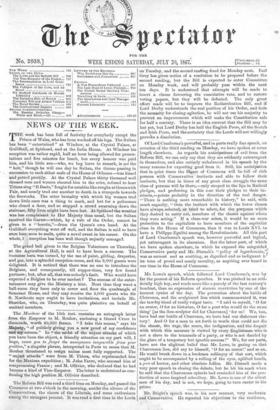Of Lord Cranborne's powerful, and in parts really fine speech,
on occasion of the third reading on Monday, we have spoken at some length elsewhere. As regards his anticipations of evil from the Reform Bill, we can only say that they are evidently extravagant in themselves, and also entirely unbalanced in his speech by the many reasons for expecting good from .it. Still, his anticipation that in quiet times the Hosise of Commons will be full of rich persons with Conservative instincts and able to follow their instincts, but that in times of any great class struggle the same class of persons will be there,—only steeped to the lips in Radical pledges, and preferring in this case their pledges to their in- stincts,—points probably in the direction of the real danger. "There is nothing more remarkable in history," he said, with much sagacity, "thin the instinct with which the lower classes have always. selected, or tried to select, for the purposes which they desired to carry out, members of the classes against whom they were acting." If a class-war arises, it would be no more protection to the capitalists to have members of the capitalist class in the House of Commons, than it was to Louis XVI. to have a Philippe Egalit6 among the Revolutionists. All this part of Lord Cranborne's speech was, however powerful and logical, yet extravagant in its alarmism. But the latter part, of which we have spoken elsewhere, in which he exposed the misguided Conservative party and Mr. Disraeli's "policy of legerdemain,' was as earnest and as scathing, as dignified and as indignant ir its tone of proud and manly morality, as anything ever heard in our time in the House of Commons.






























